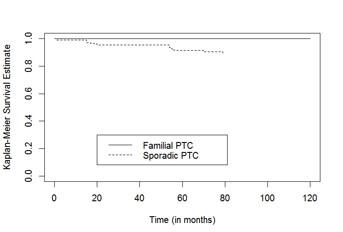Associação Portuguesa de Investigação em Cancro
Comparative analysis of familial vs sporadic papillary thyroid carcinoma shows a similar clinical/prognostic behaviour
Comparative analysis of familial vs sporadic papillary thyroid carcinoma shows a similar clinical/prognostic behaviour

The aim of this study was to compare the potential biological and clinical aggressiveness of familial vs sporadic papillary thyroid carcinoma (PTC), by assessing clinicopathological characteristics, survival parameters and DNA ploidy in two series of 107 patients, matched by age, gender, disease extension and follow-up duration. The results showed higher presence of tumour multifocality in familial PTC (index cases) and a trend to higher occurrence of extrathyroidal extension in the familial PTC subgroup with three or more affected elements. There were no significant differences for ploidy and overall or disease-free survival. It is concluded that, apart from multifocality, familial PTC appears to have similar clinical/prognostic behaviour when compared with sporadic forms of the disease.
Authors and Affiliations:
António E. Pinto1, M.D.
Giovani L. Silva4,5, PhD
Rui Henrique6,8, M.D., PhD
Francisco D. Menezes6, M.D.
Manuel R. Teixeira7,8, M.D., PhD
Valeriano Leite2,3,9, M.D., PhD
Branca M. Cavaco2,9, PhD
1. Serviço de Anatomia Patológica, 2.Unidade de Investigação em Patobiologia Molecular (UIPM), e 3.Serviço de Endocrinologia, Instituto Português de Oncologia de Lisboa Francisco Gentil, E.P.E., 1099-023 Lisboa, Portugal.
4.Centro de Estatística e Aplicações da Universidade de Lisboa, e 5.Departamento de Matemática do Instituto Superior Técnico da Universidade Técnica de Lisboa, 1049-001 Lisboa, Portugal.
6.Serviço de Anatomia Patológica, e 7.Serviço de Genética, Instituto Português de Oncologia do Porto Francisco Gentil, 4200-072 Porto, Portugal.
8.Departamento de Patologia e Imunologia Molecular, Instituto de Ciências Biomédicas Abel Salazar, Universidade do Porto, 4050-313 Porto, Portugal.
9.Centro de Estudos de Doenças Crónicas (CEDOC), Faculdade de Ciências Médicas (FCM), Universidade Nova de Lisboa, 1169-056 Lisboa, Portugal.
Abstract:
Objective: Familial non-medullary thyroid cancer has been proposed as an aggressive clinical entity. Our aim in this study is to investigate potential distinguishing features as well as the biological and clinical aggressiveness of familial vs sporadic papillary thyroid carcinoma (PTC). We assessed clinico-pathological characteristics, outcome measures and DNA ploidy.
Design: A matched-case comparative study.
Methods: A series of patients with familial PTC (n=107) and two subgroups, one with three or more affected elements (n=32) and another including index cases only (n=61), were compared with patients with sporadic PTC (n=107), matched by age, gender, pTNM disease extension and approximate follow-up duration. Histological variant, extrathyroidal extension, vascular invasion, tumour multifocality and bilateral growth were evaluated. Ploidy pattern was analysed in available samples by DNA flow cytometry. The probabilities of disease-free survival (DFS) and overall survival (OS) were estimated according to the Kaplan-Meier (K-M) method.
Results: No patient with familial PTC died of disease during follow-up (median, 72 months), contrarily to five patients (4.7%) (P=0.06) with sporadic PTC (median, 90 months). There was a significantly higher tumour multifocality in familial PTC (index cases subgroup) vs sporadic PTC (P=0.035), and a trend, in the familial PTC cohort with three or more affected elements, to show extrathyroidal extension (P=0.054) more frequently. No difference was observed in DNA ploidy status. The K-M analyses showed no significant differences between both entities in relation to DFS or OS.
Conclusion: Apart from multifocality, familial PTC appears to have similar clinical/prognostic behaviour when compared with sporadic forms of the disease.
Journal:
European Journal of Endocrinology
Link:
Eur J Endocrinol 2014;170(2):323-9. Doi: 10.1530/EJE-13-0865. Print 2014




